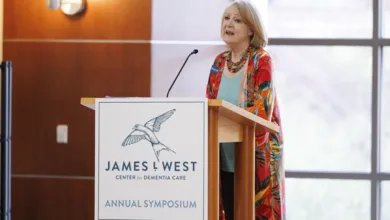Tips for Discussing Cognitive Concerns with Your Doctor

In Honor of Alzheimer’s & Brain Awareness Month
By the Alzheimer’s Association
Today, more than 6 million people 65 and older live with Alzheimer’s dementia, with 400,000 in Texas.
According to the recent Alzheimer’s Association Facts and Figures report, too often, individuals with memory concerns do not discuss the issue with their doctor — only 4 in 10 would talk to their doctor immediately. Individuals hesitate because they believe their experiences are related to normal aging rather than a potential diagnosable medical condition. Yet, 7 in 10 would want to know early on if they have Alzheimer’s disease if it could allow for earlier treatment.
“While discussing cognitive concerns with your health care provider can be challenging, it’s essential,” said Mark Denzin, Executive Director of the Alzheimer’s Association Dallas, and Northeast Texas Chapter. “Having these conversations with a doctor can help facilitate early detection and diagnosis, offering individuals and families important benefits, not only treatments but emotional and social benefits, access to clinical trials, and more time to plan the future. It is also important to note that some forms of cognitive decline are treatable.”

June is Alzheimer’s & Brain Awareness Month, and the Alzheimer’s Association offers the following three tips to help individuals discuss their cognitive concerns with health professionals more confidently.
♥ Find the right doctor. In most cases, the first point of contact for concerns about memory and thinking is with your primary care physician. Ask your physician how comfortable they are identifying and diagnosing cognitive problems and whether there are circumstances in which they would refer to a specialist. Most often, your physician will perform an initial assessment, and if cognitive decline is detected, order more advanced testing or refer you to a specialist for a more definitive diagnosis. If your doctor doesn’t take your concerns seriously, seek a second opinion.

♥ Be prepared. Come to your visit with a list of changes in your health, including your mood, memory, and behaviors. Include a list of past and current medical problems, current prescriptions, and over-the-counter medications, including vitamins or supplements. Most importantly, be sure to have your list of questions and be prepared to answer the doctor’s questions openly and honestly.

♥ Get educated. When speaking to the doctor, ask what tests they anticipate performing, what the tests involve, how long each test takes, and when the results will be available. The Alzheimer’s Association offers an interactive tour of what to expect when being evaluated for memory and thinking problems on its website.
“For the first time in nearly two decades, there are treatments for individuals with early stages of the disease that can slow down the progression and give them more time with their families and loved ones,” said Denzin. “More than ever before, these conversations about memory or other cognitive issues an individual faces are critical and need to start at the earliest point of the concern.”

To learn more about Alzheimer’s or other related dementia or resources that can help individuals and their families, visit alz.org or call the Alzheimer’s Association 24/7 Helpline at 800.272.3900.






